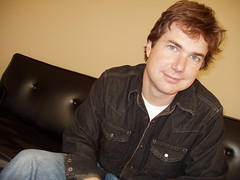Depending on who you are, the following statement might seem either utterly obvious or pure wishful thinking: The writers of the New Testament actually believed that the Old Testament was all about Jesus Christ. Let me explain why this is a post worth writing. For a long time I've been basically convinced that the Old Testament contained several prophecies of the coming Messiah, and that the New Testament writers thought that Jesus fulfilled those prophecies. Most Christians would admit as much. But it was only recently that I starting "collecting" New Testament references which show the specific ways that they thought Jesus was revealed in the Old Testament. The fairly startling result when these texts are compared is that, according to New Testament, (1) several Old Testament characters had specific knowledge of Jesus, (2) Jesus was an active agent in Old Testament events, and (3) the whole substance of the Old Testament reveals Jesus (not just a few scattered prophecies).
Here are the details: Abraham "rejoiced that he would see my [Jesus'] day" (Jn.8:56); Moses was emboldened to give up the easy life in in Pharoah's court to serve God because he "considered the reproach of Christ greater wealth than the treasures of Egypt" (Heb. 11:26); the exodus itself, as well as supernatural intervention of God in the Sinai desert was actually the work of Jesus: "Jesus, who saved a people out of the land of Egypt, afterward destroyed those who did not believe" (Jude 5); the "spiritual rock" from which the Israelites drank in the desert was none other than "Christ" (1 Cor. 10:4); the message of "eternal life" to which the Old Testament bears witness is a message centered on Christ (John 5:39). The Old Testament prophets specifically wrestled with the details of Christ's sufferings and future glories (1 Pet.1:11). In fact, the sin-atoning death, burial, and third-day resurrection of Christ are foretold in the Old Testament (1 Cor. 15:3-4). Isaiah understood his call as a prophet to be about Christ, since "Isaiah said these things because he saw his glory and spoke of him" (Jn.12:41). And, at the broadest level, the Law, Prophets, and the Psalms reveal the entire gospel, including the church's mission to preach Christ to the nations (Luke 24:25-27;44-47).
The upshot: if we agree that the New Testament (and Jesus) got all of this right, we should always read the Old Testament looking for hints and whispers of Christ. Christ's person and work are not incidental or occasional themes, but make up the very warp-and-woof of those old books. If, as the New Testament suggests, the pre-incarnate Christ haunts even the details of the narratives in the Pentateuch, let's keep our eyes open for other ways that Christ may be revealed there. Want a guide-book for this kind of Christ-centered Old Testament study? A great primer is Edmund Clowny's The Unfolding Mystery: Discovering Christ in the Old Testament.


